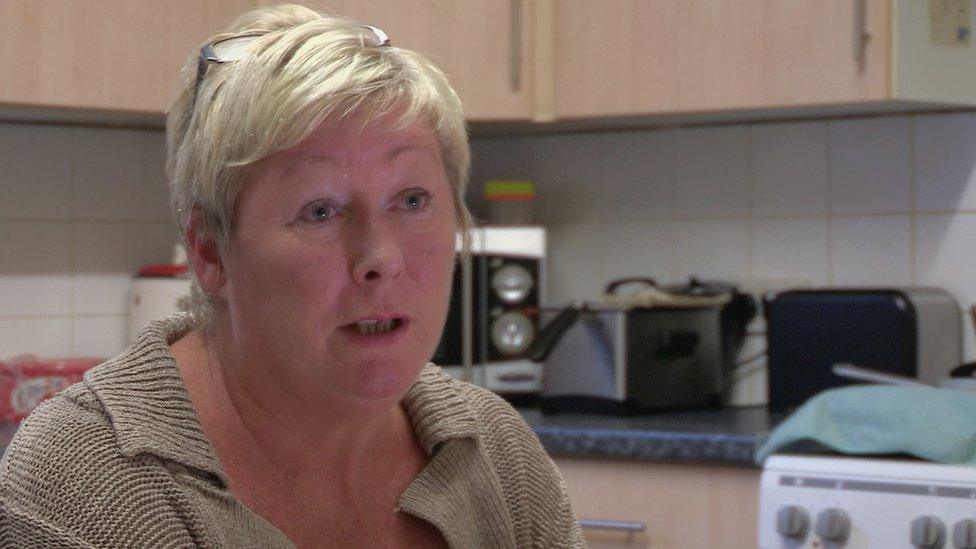Tax credits mum 'falsely accused of marriage to dead man'
- Published
Nicola McKenzie says she is struggling to feed her two-year-old son
A teenage mother had her child tax credits stopped after she was wrongly accused of being married to a dead 74-year-old man, the BBC has learned.
Nicola McKenzie is one of hundreds of people complaining they have been incorrectly punished by the US firm Concentrix, used by the government to cut tax credit fraud and overpayment.
She is struggling to feed her son, she told the Victoria Derbyshire programme.
The government said Concentrix would "not be paid" for wrong decisions.
The Treasury has revealed 120 cases since last October where the company did not "fully" meet the performance standards laid out in its contract.
But it is feared the actual number may be higher. The Facebook campaign group Concentrix Mums, which has 5,600 members, says hundreds more people have been affected by errors.
'Make contact'
Labour MP Louise Haigh is demanding that Concentrix be stripped of its contract, saying: "They've stopped people's benefits on a quite incredible scale in order to chase profits."
Ms McKenzie, a 19-year-old single mother from West Yorkshire, received a letter from the company saying her child tax credits would be cancelled.
"Basically they were accusing me of being married to a 74-year-old bloke that used to live here way before I did, saying that it's a normal thing for my kind of age," she said.

Sharon Scargill said she had £20 to last her two weeks
"When I spoke to the council, they said he was deceased and died on 5 July 2016," Ms McKenzie added. "Then they said 'Well, you still need to get him to make contact with us'. And I said 'Well, heaven doesn't have opening hours, so what do you want me to do about that?'."
Ms McKenzie said she had lost £64 a week, which meant she was finding it difficult to provide nappies and food for her two-year-old son.
In May last year, Concentrix won a £75m contract to try to save the government more than £1bn in incorrect or fraudulent tax credit payments.
Tax credits - the Child Tax Credit and the Working Tax Credit - are government payments made to households on low incomes.
Concentrix's government contract is based on a payment-by-results model, with the "maximisation of revenue flows" as one of its key requirements - meaning it makes more money if it cuts more payments.
'Very personal'
Sharon Scargill, a mother from West Yorkshire, told the Victoria Derbyshire programme her tax credits had been cut after she received a letter from the company saying she was living with another woman of whom she had never heard.
"I've got £20 to last me two weeks, as of yesterday, to feed me and my daughter and for the bills that I'm supposed to pay and the gas and electric," she said.
Ms Haigh, MP for Sheffield Heeley, said some people receiving the letters were confusing them with a phishing scam, as they asked for "very personal details", such as bank statements and information on partners' details. The problems with Concentrix were on a "grand scale", she added.
But an HM Revenue and Customs spokesperson said support was "available for those who need it", adding: "We take great care to make sure that correct tax credit payments are made to prevent customers getting into debt, which they may struggle to repay.
Conservative MP Craig Mackinlay: "We may be bringing Concentrix in for a very serious investigation"
"Payments to Concentrix are based on the quality and accuracy of their work. They will not be paid if the decisions they make about claimants' awards are wrong."
A Concentrix spokesman said: "We recognise that the re-evaluation of individual tax credits claims can be difficult for all concerned.
"We adopt a rigorous process at every stage to ensure we manage this process responsibly, and in full accordance with the protocols and guidance set by HMRC."
The Victoria Derbyshire programme is broadcast on weekdays between 09:00 and 11:00 on BBC Two and the BBC News channel.
- Published11 November 2015
